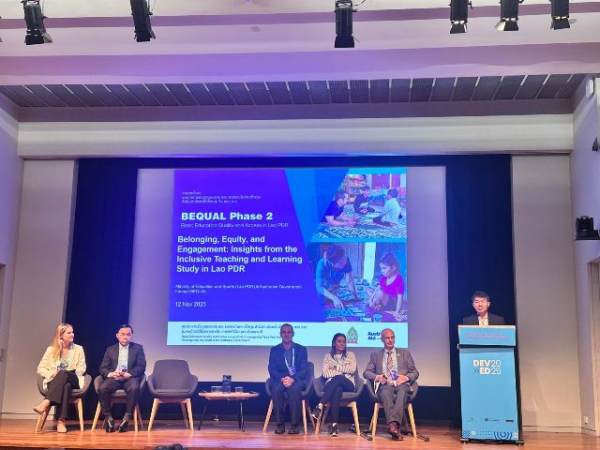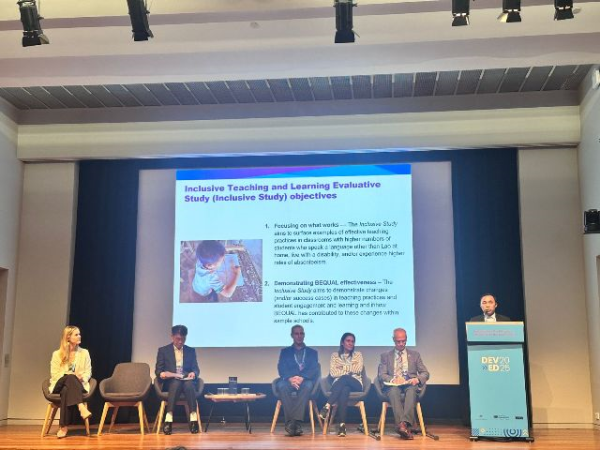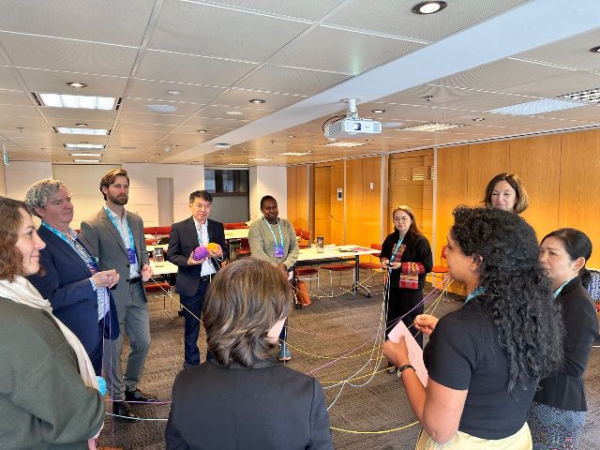KPL
Department of Teacher Education, Ministry of Education and Sports and Australian Embassy delegation present the Inclusive Teaching and Learning Study at the inaugural DevEd 2025 conference in Melbourne, Australia.

Mr. Khanthanouphone Mixaykone, MEL Specialist, BEQUAL presents the objectives and overview of Inclusive Study Research.
Representatives from Department of Teacher Education, the Ministry of Education and Sports of the Lao PDR (MoES), the Australian Embassy and the BEQUAL program, proudly presented innovative research on inclusive teaching and learning in the Lao PDR at the inaugural DevEd 2025 conference in Melbourne, Australia, November 11-13.
This landmark event brought together governments, academics, and embassy staff from Southeast Asia and the Pacific to focus on reimagining education for equity and inclusion in the region. The strong alignment of the Inclusive Teaching and Learning Study with the conference theme of “Reimagining the Future of Education” in the Asia Pacific region led to its selection to be showcased at this inaugural event.
The Inclusive Teaching and Learning Study was launched in 2024 and is led by the Department of Teacher Education (DTE) of MoES with support from Australia through the BEQUAL program. The study explores how social, psychological, and environmental factors contribute to students’ sense of belonging at school, and impact engagement and learning outcomes, especially for disadvantaged communities.

Mr. Phetmany Siladmina, Deputy Director General of Teacher Edcucation Department presents the samples of Inclusive Study Research.
Mr Phetmany Sylatmena, Deputy Director General of DTE expressed deep pride in presenting on this international platform, stating, “This study is instrumental for enhancing our continuing professional development system for teachers. By identifying teaching practices that foster inclusive student learning, we can share these promising approaches widely to better support teachers in meeting diverse student needs.”
Echoing this sentiment, Ms Vanessa Hegarty, First Secretary, Australian Embassy said, “Australia is committed to inclusive education because every student deserves learning environments that are responsive, respectful, and supportive. Having our partner, the Ministry of Education and our team presenting this research internationally highlights our shared commitment to addressing school dropouts by fostering students’ sense of belonging.”
The delegation shared qualitative and quantitative evidence and key findings from the Inclusive Study through an academic presentation session. They then led a creative workshop titled “Weaving Lao cultural and Australian Indigenous kinship perspectives to understand student belonging and engagement in school.” The session invited participants into a collective exploration of nurturing student belonging and its vital role in engagement and learning through a symbolic activity inspired by Lao PDR’s Baci ceremony. This facilitated personal exchanges to explore diverse cultural understandings of safety, harmony, and significance in education. Shared examples were then categorised using the Inclusive Study’s ‘Belonging Framework’, a unique analytical and research framework developed by educators from the Lao PDR and First Nations Australian advisers through the BEQUAL Program.

The session invited participants into a collective exploration of nurturing student belonging and its vital role in engagement and learn.
Mr Phetmany shared, “Through this session, we are co-creating insights that will enrich our understanding of student belonging across cultures and help shape more inclusive schools.” Ms Vanessa added, “This dialogue not only shares knowledge but strengthens cross-cultural connections that are essential to fostering inclusive education throughout the Indo-Pacific.”
At its core, the Inclusive Teaching and Learning Study presents the Belonging Framework as a practical tool for teachers, schools, and policymakers. By embedding cultural values and relational ways of knowing into its research design, it models a locally grounded, equity-focused approach that directly responds to the DevEd 2025 theme of prioritising student experience and meaningful participation of all learners.
This international presentation underscores the power of the MoES-Australia partnership in generating robust evidence and sharing effective strategies for teacher professional development and student engagement. It shines a light on how education systems can better support every learner through culturally responsive, inclusive practices.
KPL